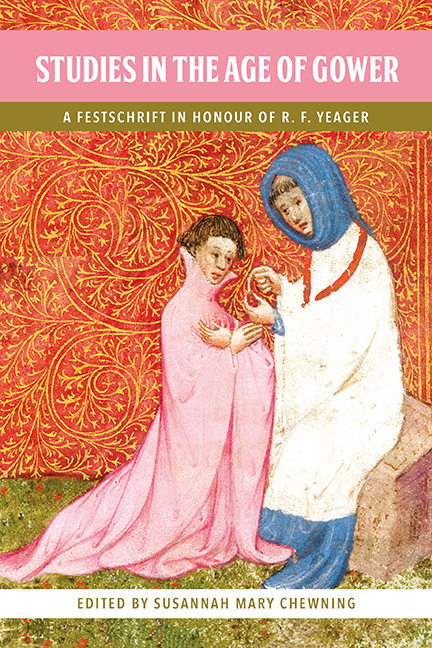Book contents
- Frontmatter
- Contents
- List of Illustrations
- Notes on Contributors
- Acknowledgements
- List of Abbreviations
- Introduction
- Part I Text
- Part II Gender
- Part III Time
- Part IV Spirit
- Part V Intersections
- A Personal Tribute to R.F. Yeager
- Bibliography of R.F. Yeager’s Writings
- General Bibliography
- Index
- Miscellaneous Endmatter
12 - “To Hear an Old Man Sing”: Apollonius, Pericles, and the Age of Gower
Published online by Cambridge University Press: 28 April 2020
- Frontmatter
- Contents
- List of Illustrations
- Notes on Contributors
- Acknowledgements
- List of Abbreviations
- Introduction
- Part I Text
- Part II Gender
- Part III Time
- Part IV Spirit
- Part V Intersections
- A Personal Tribute to R.F. Yeager
- Bibliography of R.F. Yeager’s Writings
- General Bibliography
- Index
- Miscellaneous Endmatter
Summary
THAT JOHN GOWER CAME to be associated with old age was in large part his own doing, as he goes to some length to present himself that way at the end of Book VIII of Confessio Amantis. Regardless of whether one seeks to match the costume of Gower the Chorus of Pericles with that of the poet Gower's tomb effigy, the correspondences between Pericles and the Apollonius story in Book VIII of Confessio Amantis are well-marked, though critical focus has tended to be on how Shakespeare drew from the medieval poet, rather than on how the medieval poet may have addressed issues that would come to be important to later playwrights. In particular, this essay seeks to examine how the play picks up not just on the narrative romance elements of the Apollonius story, as well as Gower's resonance as a Roman Catholic writer, both of which have been the subject of recent critical attention for the play, but also on Gower's self-presentation as aging or old. Thus, this essay asks not only why the later playwright might have been interested in the Apollonius story, but also why Gower's version of it within the larger context of the ending of Confessio Amantis might have been particularly relevant for adaptation into a play in the early seventeenth century. The essay balances a primary focus on Gower in this increasingly familiar comparison between texts with an interest in how a focus on Gower's perceived agedness contributes to our understanding of Pericles.
One element that we misplace if we focus primarily on questions of whether Shakespeare used Confessio Amantis as a source, rather than, for example, Laurence Twine's 1607 reprint of The Pattern of Painfull Adventures, is just what use Shakespeare was making of Confessio as a source, and how deep the intertext is meant to be. Given Shakespeare's profligate borrowing, it seems unnecessary to pin down every possible source, but when the author of a probable source appears as the first speaking character in the play, viewers cannot but assume that source to be the primary one. Featuring a source author as the chorus is atypical, though as a practice it is not unheard of.
- Type
- Chapter
- Information
- Studies in the Age of GowerA Festschrift in Honour of Robert F. Yeager, pp. 189 - 200Publisher: Boydell & BrewerPrint publication year: 2020

